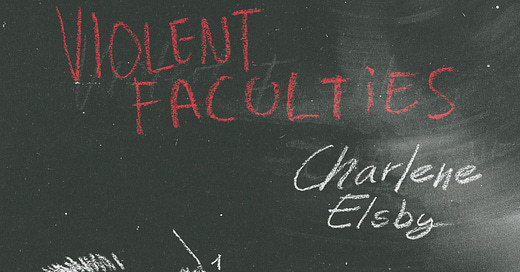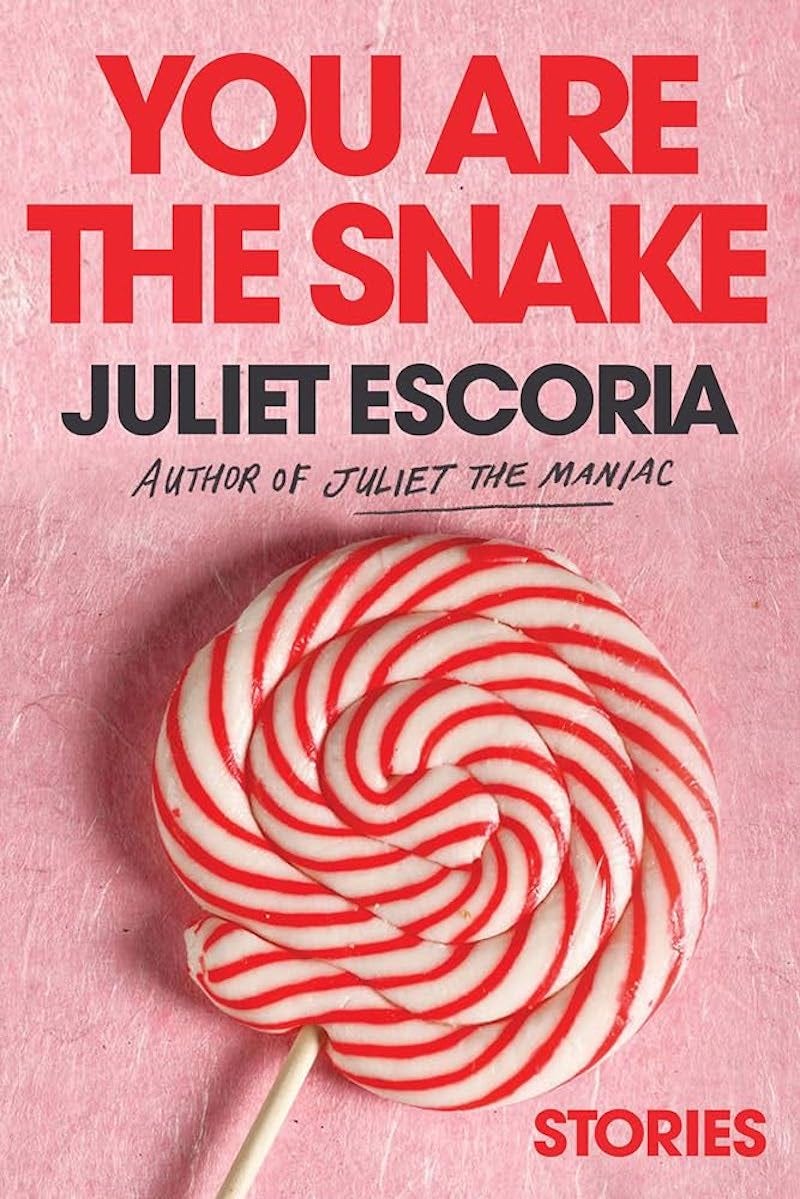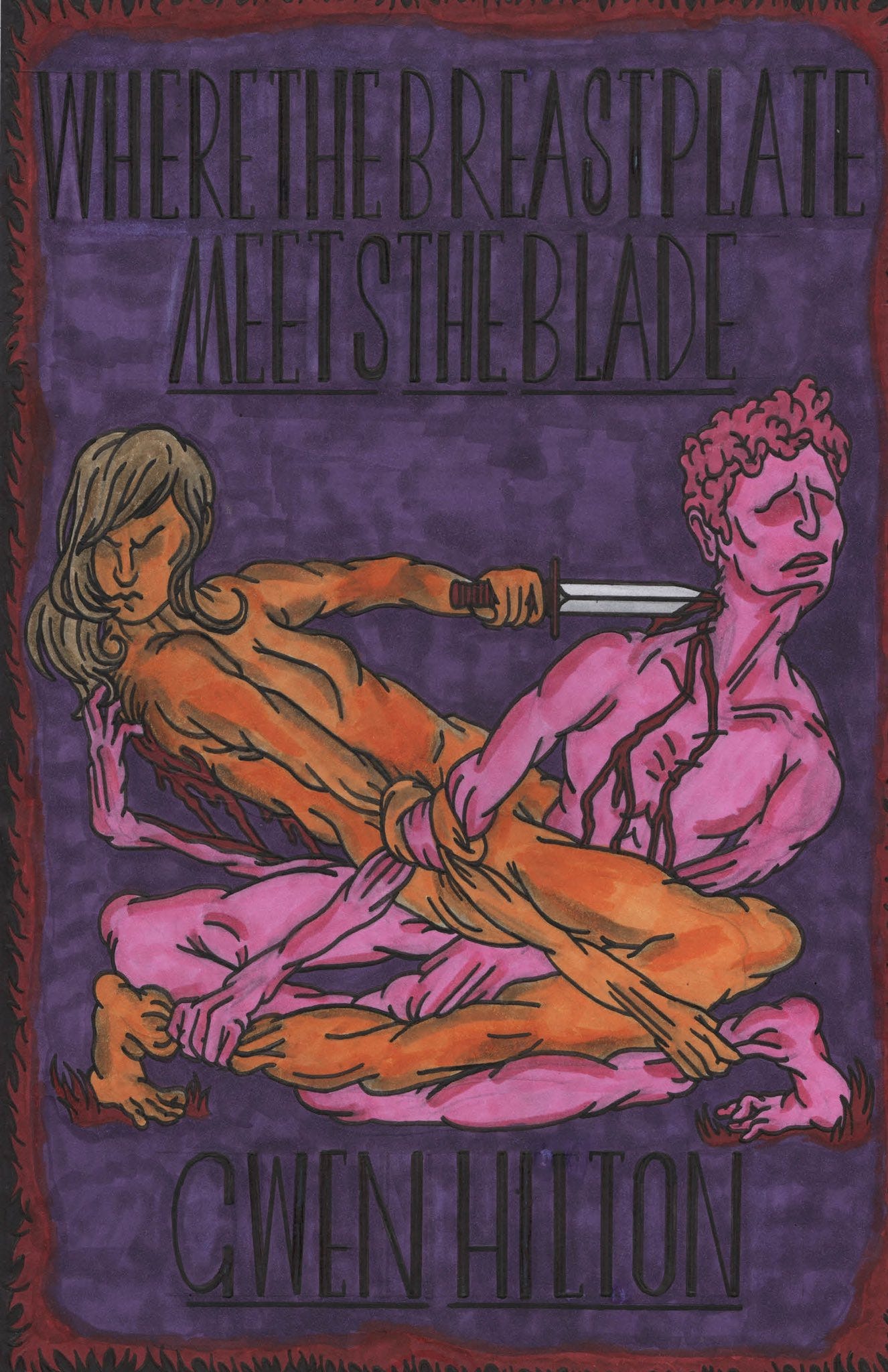Elsby, Escoria, Hilton
5 thoughts apiece on 3 new books tracing their own path beyond the ever-blurry borderlines of highly stylized violence, sexuality, and discovery
1. I love high concept novels that never wink and tell the reader it’s ok. Right out of the gate, Violent Faculties goes for the throat with a sort of formal horror so rigorous in its design that by the time you catch up to where it’s heading, it’s already too late. From a remove, the book contains academic descriptions of a series of experiments by a female professor who abducts men and women to perform violent sexual experiments on them in an attempt to define the limits of the human, and thereby to draw more and more extreme conclusions based on the results. There’s a strange stereoscopic energy here that manages to hypnotize despite the novel’s no holds barred extreme content, forcing the reader to stand and look on in awe as the narrator continues barreling off the rails from a process steeping in scientific method, to one so unhinged in its realization that, like a train crash, it’s impossible to look away from.
2. Elsby’s affinity for getting nasty is hardly mere navel gazing, or even merely prurient in how it uses shock and awe to take the reader by their mask and not let go. This novel shares a compelling overlap with virulent cult icons like Peter Sotos and New Juche in that it forces the reader into suffering experience while also maintaining a clinically precise tone and refusing to allow the entrance of formal energy that would demand this kind of content be boarded up. Unlike those other two, though, Elsby’s exploration feels tongue-in-cheek in equal measure to its uncanniness, which turns out to lend her even further power in manipulating the reader to stay both emotionally and logically in tune with a sickening feeling that her scenarios demand, thereby making it feel less alien or shlocky in same breath that it unpacks its ideas and pushes them to the far end of their intent. It actually feels like a kind of research, I suppose I’m saying, even though the scenes and themes here are very clearly campy and ridiculous on purpose.
3. When I say tongue-in-cheek, I’m mainly reacting to an undercurrent running through this novel that pervades its putridity and violence with a very different sort of rage that we usually assume motivates novels so willing to get sick. I think I made an “eww” face when I first noticed that the author’s full name is listed in the top right margins of the book as “Charlene Elsby Ph.D.,” which should seem vainglorious or geeky, sort of, if you remained unable to separate Elsby the author with Elsby the narrator and conductor of the grand guignol. One almost ignores the author’s note in the early pages that informs the reader the novel was submitted in application for tenure at the Department of Philosophy where Elsby works, though over time, as we continue to be immersed in the logic and ethos of she constructs around her project, we realize that the narrator’s fury isn’t simply vengeful against the wicked and depraved—or rather, perhaps it is, but in this case, the wicked and depraved are the university and her cohort, who as an institution have forced Elsby into the extreme predicament she finds herself stranded in: being used for profit and utility, forced to work in fear of the axe, and general ambient backwardness that permeates bureaucratic academia. By repurposing the brunt of the desire to torture and kill in this context, Violent Faculties is more like a liberating vehicle, wrapped in wolves’ clothes, than another shit pit for gore games.
4. And yet it’s definitely also a shit pit for gore games, in the best way. Elsby’s imagination for making clinical games out of thought experiments is in no way limited to speculation and head cheese—she goes deep, and she goes hard. The image of a woman having her tongue cut out on the novel’s cover is just what happens in the first chapter, when the narrator decides to see if speech alone is what makes us human. Much of this book feels like a vision quest in this manner, attempting to thread together workable and ethical interpretive research from a base state of a violence ubiquitous to the point of invisibility. Where other extreme novels rely on the reader’s affect to drive their points home, Elsby is able to expand the field of play greatly by zooming in on the quickly steepening logic that provoked its exploration in the first place, somehow both clarifying and obfuscating its cultural context by annotating her process with quotes and asides culled from her Ph.D. curriculum, including Augustine, Aristotle, Boethius, Descartes, Plato, etc. By plying the high with the low in this fashion, and fashioning the whole into a kind of collection of academic documents, Elsby is able to both illuminate from within, and protest from behind a mask of nails.
5. For all its unwieldinesses, I found Violent Faculties hilarious and disconcerting both, and semantically alive in a way that few horror-laced texts are able to straddle so effectively and economically. There’s simply zero wasted space here, and Elsby’s wit as a philosopher herself, mingled with her campy-on-purpose sense for extremity, provides food for thought that even the gnarliest sentence chefs tend to leave stranded behind glass. She’s able to take on some of our era’s largest morals issues—abortion, consent, spirituality, the costs of survival—and repackage them not as a dank reproval, preaching to the choir, by rather by bending the would-be reader’s arm back so far they have no choice but not to get a little adrenalinecore. I’ll be looking forward to reading more Elsby ASAP.
1. I seriously can’t think of another writer who is able to pull off making it look so easy to say the kinds of blunt/raunchy/pointed things about extremely relatable but often trauma-heavy themes as Juliet Escoria. It’s like she has a license to kill and yet she’s grown up enough in having lived through addiction and self-destruction that she knows the better way to get under your skin forever is to slide in close, play coy, then rip your head off and leave it on the side of the road somewhere.
2. You are the Snake is evidence of a life lived on the edge of a knife. The narrator spanning these highly personal and reflective stories speaks with extreme economy about the dark shit she’s been through, leaving the precious sentimentality so many recent books insist on plying whenever depicting ‘transgressive’ content. The effect is compellingly disorienting in that way—like you expect there to be more horror or handwringing involved in stories that depict the darker complications of suicidal ideation, dementia, domestic violence, and drug abuse of every color, but Escoria is always already a step ahead, moving on to other complications and machinations while you’re standing there with your pants down thinking you already know what you should feel.
3. Escoria has a wicked knack for pulling the rug out from under the reader when they least expect it, and doing so in a way that tends to repurpose the energy of the story she’s so meticulously and matter-of-factly laid out. Though the book is loosely organized in a chronological fashion that allows us to follow the primary narrator from her wayward adolescence in San Diego to growing up, finding love, and moving away from home to begin another life, the collection never slips into feeling calculatedly redemptive in that fashion. In fact, it’s often the narrator’s demented glee or cutting remarks about the various assholes she spends time growing up alongside (including herself) that makes the voice feel simultaneously close and cagey, honest about shit no one usually wants to have to be honest about.
4. Instead of forging into unnecessary nostalgia or diffuse reflection to bring home the bacon on a story about a strained relationship with a female friend, as in the story “Nicole Took Her Shirt Off First,” Escoria has the friend punch her narrator in the face, call her a whore, and kick her out of her car, and that’s that. For once, a story that isn’t afraid to slam the door in your face and leave you hanging—so much more like real life than buttered bread, no? It feels like an actual relief, not having to dicker about ethics and safe words, and instead wading straight into the deep end and staying there. Another favorite story, “Roadkill,” begins with the narrator copping to killing a cat and ends with her and her girlfriend jacking a guy off together and then making fun of him when he comes. By utilizing such a wide range of semi-sadistic acts throughout the book, we simultaneously feel more comfortable with her, like we can trust the nastiness wholesale, and uncertain what’s going to happen to her if she continues following her own trail. Are we supposed to like this character and hope she’ll make it or think she’s so insane we shouldn’t trust a word she says? My guess is it’s a trick answer to a trick question: neither and both. That kind of math is for goons, and much of the identity-sculpting fun that is to be gleaned from reading between the lines here isn’t merely a moral curative or a parable; it’s about the far more piecemeal parts of being most people prefer to discard or pretend they’ve outgrown for good, as if we aren’t all made of little more than love and junk.
5. For all the fractious punk shit this book is rifled with from ear to ear, it also refuses to feed forever on its own blood. Amidst so much time with drugs and violence, and even as unrelenting as she may seem, there is a sacred calmness backdropping the whole array that continues to gather as the narrator continues to assemble scenes, relationships, and facts throughout her life. The rising desire for a sense of self leaking through the madness in moments where see the previously besieged and angsty narrator finding meaning even more so in being forced to face it head-on so completely. Some of Escoria’s finest writing ever finds her synthesizing alienation, loss, and despair with an intuitively renewed sense of desire, hope, and awe, in a way that feels not only hard won, but more earnest than a collection that refused to parse the way one’s brain changes as they escape their own destruction because they want to; because, finally, sometimes you can only realize there is more to life than misery after having fallen in so deep you’re lucky to still be alive. This book feels like a triumph in that fashion, and simultaneously a model for how writing about darkness need not always come implied with a whip or a prayer, but with a ruthless eye and a killer sense of humor.
1. “You’re the first person I’m telling,” the narrator of Where the Breastplate Meets the Blade confesses in its opening sentence. “Seriously.” It’s a kind of introductory moment you might not even catch the import of, simple as it is—and from here on, there will be no turning back from the onslaught of insights and experiences comingled amidst a search for understanding in a terrain where understanding is as rare as any precious metal. Spanning its 89 chapters, ranging from a single sentence quip to a many-page personal history, Gwen Hilton’s second novel feels like an onslaught of secrets unleashed into the wild, relating a wildly discontinuous archive of sexual and romantic encounters with the unprecedented diction and relentless energy of an unedited web forum. As simple as it might sound in premise, I can’t think of many books that come anywhere close to packing in as much singular life material as Hilton can in a couple pages—Geraldine Kim’s Povel comes to mind—all compressed into a voice that makes its wide range of sticky references and tones feel not only natural, but inviting; actually warm in a way that most books so willing to “indulge” and break convention can never be.
2. One of the ways Hilton is able to draw and hold us close throughout her elucidation of a long series of complex relationships and desires is to inhibit a kind of kitchen-sink materia, syncing a stream-of-consciousness type flow with highly atomized references, juicy asides, and a reliable self-awareness that makes her knack for deep indulgence just feel honest, even unaffected by the extreme states she often finds herself amidst. From Girls Gone Wild to Lingua Ignota, Dragon Ball Z to Buyer’s Market, the novel is permeated with a kitschy tableau that brings it to life in a much different way than most previous irony-laden reference-heavy texts. It feels off to call this a slice of life novel, and yet the vivacity with which Hilton Jackson Pollocks her testimony from sensual extreme to everyday shlock feels alive and singular in a way that other equally singular voices often fail to resolve so cleanly.
3. This novel is also surprisingly emotional, given how simultaneously searching and nonplussed it manages to feel as we follow the narrator through Tinder hookups, open relationships, and kink. “I used to suck skinny guy’s dicks and think wow I’m so lucky to suck this dick because he’s thin,” Chapter 27 reads in full—a great, rib-sticking line that appears joke-book on the surface, perhaps, but from my view feels loaded, much more innately hurtful than a larger diatribe on self image and abuse. Hilton’s prose is super refreshing in this fashion in that it never needs to linger on its own misery or obvious uniqueness for very long, always ready to keep twisting the butter knife and seeing what else comes spurting out. Despite the novel as a whole feeling extremely consistent, we never end up cauterized behind a wall designed to hold us apart from the reality at hand, and the narrator’s willingness to keep spilling and searching pays dividends in remaining like an island unto itself. I love reading books that I never know what the next sentence is going to say—a feature often mistaken for the ‘stream of consciousness’ tag as if that’s bad—and Hilton continuously rewards the reader for sticking with her, developing a flat but rapturous sort of sense that by the novel’s end reaches real transcendence—earned from living.
4. Alongside its relationship-seeking narratives, WTBMTB is also rich in its depiction of the experience of transition over time, unafraid to share aspects of everyday life that cis people like myself likely have very little direct access to explore as texts. In sharing and unpacking her family history and how it changes in the wake of self-discovery, we’re able to inhabit in what feels like a real way how it feels to go through change, and to be judged. Unlike neater packages that might seek to atomize such difference into a stumbling block for the reader, Hilton forgoes explicit social theory or moralizing and instead immerses you in the scene itself. Her often short, staccato sentences relate through demonstration and evocation rather than ranting or pleading, and the result tends to seem realistic and relatable even through experiences that remain hers—not simply sharing but laying bare. It feels caring, giving, without the window dressing that would insist it stands apart and scowl, and from therein rides real power.
5. It’s hard to find a book that manages to experiment with style and texture and humor as much as this does while also maintaining an emotional coherence void of cliché. I feel like too often ‘originality’ comes with footnotes, easily traced back to its source or otherwise diluted by wearing its intent too sheerly on it sleeve. Maybe the most lovely thing about this book is how effortless it feels despite its kaleidoscopic array of intuitions and blue events, like for once we’re listening not necessarily to learn or be entertained, but to be immersed headlong into the runny juices of the soul bared in an Outback parking lot, or while having surgery, or attending Pitchfork fest. It feels like the future of fiction to begin learning to find beauty where we least expect it, rather than forcing beauty onto the already known, and to that end, quite thankfully, Gwen Hilton is crushing ass.







I am especially drawn to Juliet Escoria’s novel, actually her entire oeuvre, and I too appreciate her honesty on the page even if she were lying. Another great post Blake. Keep em coming.